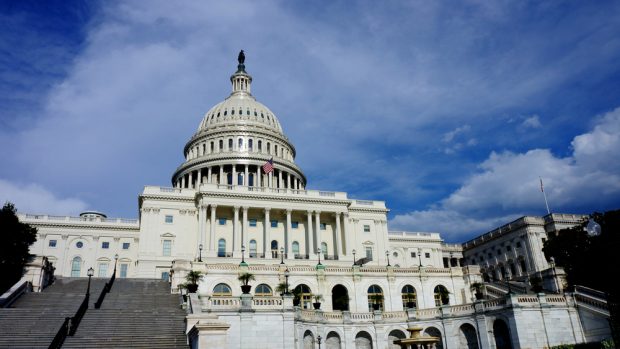 U.S. Capitol steps. (Source: Shutterstock)
U.S. Capitol steps. (Source: Shutterstock)
The coronavirus economic stimulus bill passed by the House and Senate late Monday night includes an unprecedented $12 billion set-aside for the Community Development Financial Institutions program and an extension of pandemic-related provisions governing the NCUA's Central Liquidity Facility.
The legislation also extends the Paycheck Protection Program and Troubled Debt Restructuring provisions sought by credit union trade groups.
Recommended For You
The proposals are contained in two measures that Congress is set to consider before leaving the nation's capital — one is the latest coronavirus economic stimulus, and the other is a FY21 omnibus appropriations measure that will fund much of the government through the end of the fiscal year.
"This is all very good," said CUNA Chief Advocacy Officer Ryan Donovan, adding that those provisions will "help credit unions remain in a position to help their members."
Congress has combined the two end-of-year measures into one bill, totaling 5,593 pages.
The stimulus section includes:
- The $12 billion for the CDFI program including $9 billion in emergency Treasury Department capital investments to CDFIs and Minority Depository Institutions to support lending in low-income and underserved communities. Of the $9 billion, $4 billion will be set aside for institutions with under $2 billion in assets, of which $2 billion must go to institutions with under $500 million in total assets.
- $3 billion in emergency support for the CDFI program to provide services such as technical assistance.
- An extension of CLF provisions contained in previous stimulus legislation; it would extend the CLF's borrowing authority from 12 times its capital to 16 times its capital.
- A continuation of the TDR provision, which will allow financial institutions, including credit unions, to suspend regular accounting procedures for loan assistance for a borrower that the bank normally would not consider.
The FY 21 omnibus appropriations section includes:
- $270 million for the CDFI program. The House had called for $273.5 million for the program, while the Senate bill included $262 million. In its statement on the FY21 appropriations bills, the Trump Administration had said it continues to oppose CDFI funding.
- $1.5 million for the NCUA's Community Development Revolving Loan Fund. The Senate had proposed no funding for the program, while the House bill included $2 million for it.
- A provision that drops a House plan for a pilot program testing postal banking.
House Financial Services Chairwoman Maxine Waters (D-Calif.) said she was pleased with the CDFI provisions in the stimulus measure.
"CDFIs and MDIs are critical sources of capital and investment for our nation's low-income communities and for communities of color and they need additional resources and tools to help them to support the communities they serve," she said.
Inclusiv, the association representing community development credit unions, said credit unions were persistent in their lobbying for the CDFI provisions.
"This is an unprecedented achievement for CDFIs and MDIs and is the culmination of nine months of persistent advocacy by credit unions, Inclusiv and our industry partners on behalf of the low- and moderate-income communities we have continued to serve during this crisis," the group said in a statement.
Mike Beall, chief strategic and advocacy officer at CU Strategic Planning, a consulting group that assists credit unions in writing CDFI applications, agreed that lobbying was intense.
"CU Strategic Planning has worked extensively with a bi-partisan group of congressional Appropriators and the four corners of leadership to secure these funding opportunities for credit unions, and to make certain credit unions play a hugely significant role in helping working families stay on a pathway to financial security," he said.
The Troubled Debt Restructuring plan did not initially receive a warm reception on Capitol Hill, John McKechnie, senior partner at Total Spectrum, said.
"Everyone knows the old saying about how patience is a virtue, but I think the final results in this bill shows that persistence is, too," he said. "Troubled Debt Restructuring extension initially got a cold shoulder from many on Capitol Hill, but we hung around, kept pushing the idea. And late in the game it got traction, in part because there was a case to be made that credit unions are using it for good at a time when everyone needs a little grace."
The CLF provisions made sense as well, Jay Murray, chairman of the Corporate Credit Union Alliance, said. "We still face uncertainty in our economy in the coming months," he said. "Corporate credit unions, and the industry at large, never wavered in our pursuit to support credit unions and their members."
© Touchpoint Markets, All Rights Reserved. Request academic re-use from www.copyright.com. All other uses, submit a request to [email protected]. For more inforrmation visit Asset & Logo Licensing.






